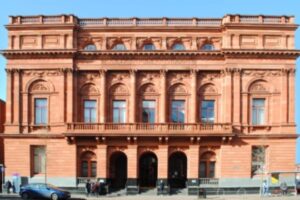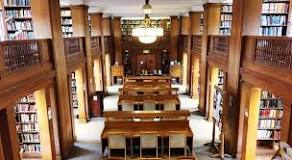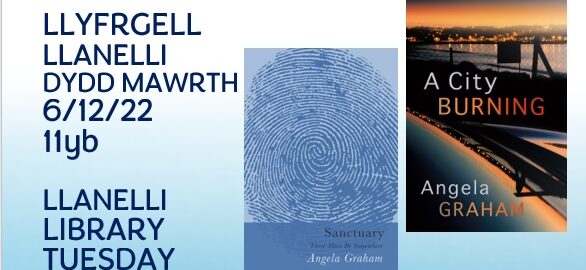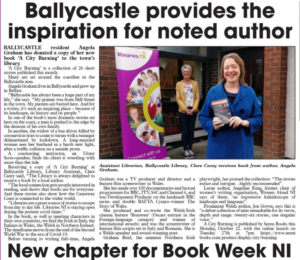Libraries Wales Author of the Month December 2022, Angela Graham reflects on the role of public libraries in her writing life.
Cardiff Central and the Canton branch are the libraries of Wales which I know best. In their different ways, but working together, they have supplied me with a range of books which I could never have accessed on my own, either because of cost or because a librarian’s advice steered me towards something I would have issed unaided.
The university libraries of Wales have been a terrific resource, not only for books, but images and film, voice recordings and maps and documents.
What they all have in common is that they offer plentitde, ample resources, more than I imagined; and in that ‘more’ they broaden my outlook and extend my reach into my own life and the lives of others. They nourish. They nurture.
Libraries exemplify the Common Good. They’re a demonstration of how resources, that might have been restricted to a few, can be shared by many.
I grew up in east Belfast. I came to Wales when I married a Welshman.
My parents couldn’t afford to buy books though they both enjoyed reading. We had a dozen in the house, all hand-me-downs. It was through public libraries that the world of books opened to me.
The local library was housed in the semi-basement of Euston Street primary school. It was a modest-sized room though it seemed large to me. The children’s section was shelved in three or four bookcases in a right-hand corner. When I’d read them all I drifted leftwards, reading as I went.
Then there was the Central Library. It is an imposing Victorian edifice, made even more impressive by the fact that its entrance is at the top of a flight of steps, set high above the pavement. Its door was a revolving cylinder of brass and glass – very exciting to negotiate as a child. Inside is a lofty vestibule and the children’s section was extensive, warm, with a parquet floor and much sunlight. I was only there a few times because it wasn’t near where we lived. I remember it as a glimpse of comfort, of thought about what children might like.

In contrast, it was in the vestibule that I saw, for the first time, evidence of the horrors of the First World War. There was a display in glass cases of photographs of carnage and mud-covered corpses. They opened my eyes. They haunted me.
In my first year in grammar school we had to do a project on a saint. For some reason mine was an obscure figure. The only way to get information was through the Central Library. After work, for several days, my mother accessed the relevant reference book and copied out the information for me. I still have those hand-written notes.
My mother worked as a medical secretary in a hospital. On rare days when school was off I would go in with her and spend the time in the medical library. I was fascinated by the anatomy books, especially those which had sheaves of cellophane illustrations which you peeled back to go deeper and deeper into the body, evidence of her respect for the written word and her very practical love of me.
We moved house when I was thirteen and there was a branch library within walking distance. There I came across science fiction and astronomy.
I studied English Language and Literature at Oxford University. For two years I lived on the floor above the excellent college library. At any time of the night, I could go down the back stairs and drift around the library reading whatever I fancied. It was paradise.

Perhaps Paradise is a kind of library. That rather strange idea may be somewhere in the background of this poem of mine.
Trust
Journaling heart, I read your steady record
not as a pledge of permanence but a wry reminder
that you’ll let me down one day, your ink run dry.
Unfazed, you tell me your account will stand, now
and in eternity where I, suffused with story,
will swim in narrative – each life that ever lived
an open book: beginning, middle, and an end
that buds unendingly. Isn’t heaven this –
to know and to be known? I’d best be about my work,
you chide me, for what’s the point of all these days
if not to build a house of love, underway
here, and there roofed with an answered “Why?”
I have given a copy of my short story collection and poetry collection to Ballycastle Library in County Antrim This is the town my paternal grandmother came from. Her father and grandparents were illiterate. I want never to take reading and writing for granted so I am happy to support libraries whenever I can.
Published online, with other poems, as a Black Bough, Silver Branch feature, January 2021
https://www.blackboughpoetry.com/angela-graham
Angela is the author of poetry collection, Sanctuary: There Must Be Somewhere and short story collection, A City Burning

